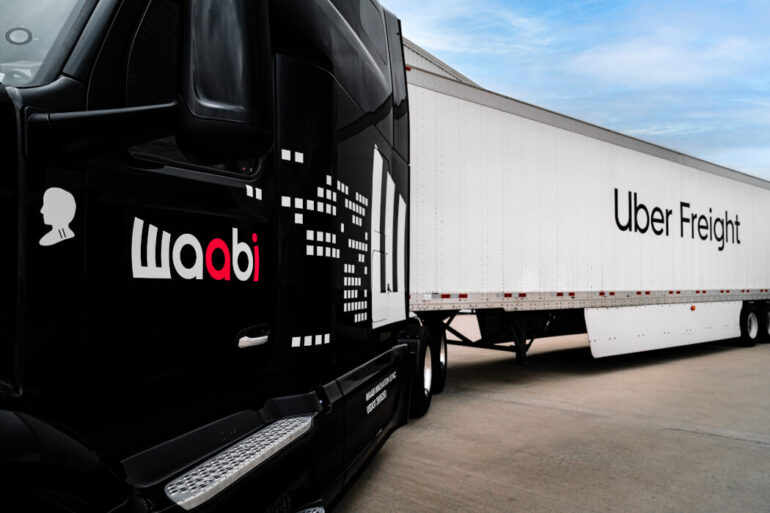Toronto-based autonomous vehicle (AV) startup Waabi has teamed up with United States (US) ride-hailing giant Uber’s logistics arm, Uber Freight.
The 10-year partnership will bundle Waabi’s core technology, Waabi Driver, with Uber Freight’s logistics platform, marketplace, and autonomous trucking operations to create what the two firms claim will be a “first of its kind” turnkey driver-as-a-service solution.
In an interview with BetaKit, Waabi founder and CEO Raquel Urtasun called Uber Freight “a very natural, big first go-to-market partner” for her Canadian artificial intelligence (AI) firm. “From our perspective, we believe digital brokers will be an important part of the equation of that self-driving future,” she added.
“We believe digital brokers will be an important part of the equation of that self-driving future.”
– Raquel Urtasun, Waabi
By joining forces, Waabi and Uber Freight aim to provide shippers and carriers with the infrastructure to deploy and manage autonomous trucks. Urtasun noted that partnering with Uber Freight gives Waabi access to its network, which includes $18 billion USD worth of freight under management across 100,000 carriers, 5,000 shippers, and more than two million drivers as it continues to develop and gears up to eventually deploy its tech in fully driverless vehicles.
During the next decade, Waabi and Uber Freight intend to deploy “billions of miles” worth of Waabi Driver capacity, starting with Texas, where its first commercial route is already live between Dallas and Houston with Waabi Driver-enabled trucks and humans on board. Over time, Urtasun said the two firms will expand to other roads across Texas and beyond.
The Waabi partnership reacquaints Urtasun with Uber, where she played a key role at the company’s self-driving unit Uber ATG as chief scientist, leading its Toronto research and development lab. Urtasun has worked in the AI and AV space for years. In addition to her work at Uber, the University of Toronto computer science professor also co-founded Toronto-based AI research hub Vector Institute.
When Uber sold Uber ATG to US-based autonomous vehicle startup Aurora in late 2020, its Toronto lab was left out of the deal. Urtasun left the company shortly thereafter to launch her own self-driving company in Waabi, securing over $100 million CAD in Series A funding and support from a group of big-name backers and AI luminaries that included both Uber and Aurora. Earlier this year, Waabi added Swedish automaker Volvo (and fellow Uber Freight partner) to its investor ranks.
“This exciting partnership allows us to bring Waabi’s revolutionary generative AI innovation to the forefront of our vast freight network, providing our shippers and carriers nationwide with the tools needed to embrace autonomous technology and transform their operations safely and efficiently,” Uber Freight founder and CEO Lior Ron said in a statement. “We are thrilled to work with them to usher in a new era for our industry.”
RELATED: Volvo backs Waabi to accelerate driverless trucks commercialization
Urtsaun added: “I have known [Ron] for many years and we both have tremendous respect for each other … He’s seen, firsthand, what we can build from the Uber days.”
While ride-sharing remains Uber’s core business, the company currently serves two other major markets: food delivery and freight. Launched in 2017 and run as an independent operation, Uber Freight pairs trucking companies with folks looking to transport loads. According to Urtasun, Uber Freight is “the most technologically-sophisticated player right now in the digital brokerage [space].”
However, Uber Freight and other freight brokerages—including Shopify-backed US firm Flexport—have faced challenges recently amid a broader trucking downturn. Per CNBC, Uber Freight cut three percent of its staff earlier this year. In May, Bloomberg reported that Uber was considering spinning off Uber Freight in a sale or as a separate publicly-traded company in order to streamline its focus on ride hailing and food delivery. At the time, Uber declined to comment on that report.
Waabi first unveiled its proprietary AV simulator, Waabi World, in early 2022. Last November, the company announced its first product: the Waabi Driver, which includes both vehicle-mounted sensors and automated driving software. Waabi’s approach involves using Waabi World and generative AI to simulate the driving experience for the Waabi Driver, training it to respond to a wide variety of common scenarios and rare edge-cases before deploying it on the road for testing—which Waabi began doing last year with human drivers and safety engineers on board.
RELATED: Raquel Urtasun’s Waabi gearing up to hit the road
Autonomous driving tech has historically been cost-intensive to develop, difficult to scale, and raised safety issues. Years of limited progress on self-driving tech development and deteriorating economic conditions have helped fuel what Urtasun previously described to BetaKit as a “winter of AV,” with major players and billions in value wiped out.
According to Urtasun, Waabi’s strategy is much cheaper, safer, and more scalable than traditional road testing-first approaches. “As more time passes, it is more clear that this is the right approach,” she argued.
From a commercialization standpoint, Waabi has set its initial sights on autonomous long-haul trucking, where the startup sees an opportunity to help address the industry’s labour shortages, safety concerns, and ongoing supply chain problems. Over the longer-term, Urtasun believes there is potential for Waabi to expand into other use-cases.
Feature image courtesy Waabi. Photo by Debora Conn.

